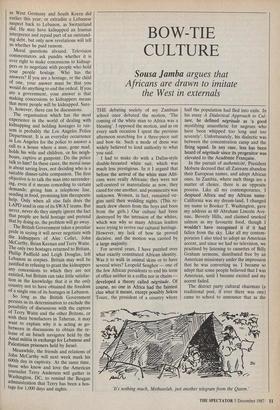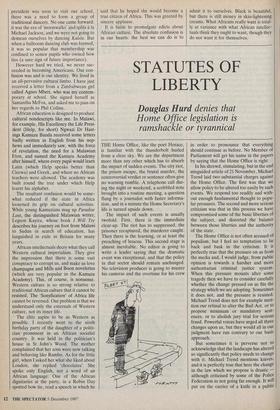B OW-TIE CULTURE
Sousa Jamba argues that
Africans are drawn to imitate the West in externals
THE debating society of my Zambian school once debated the motion, 'The coming of the white man to Africa was a blessing'. I opposed the motion, and as on every such occasion I spent the previous afternoon searching for a three-piece suit and bow tie. Such a mode of dress was widely believed to lend authority to what you said. I had to make do with a Dallas-style double-breasted white suit, which was much less prestigious. In it I argued that before the arrival of the white man Afri- cans were really Africans: they were not self-centred or materialistic as now, they cared for one another, and promiscuity was unknown. Women, in fact, remained vir- gins until their wedding nights. (This re- mark drew cheers from the boys and boos from the girls.) Our culture had been destroyed by the intrusion of the whites, which was why so many African leaders were trying to revive our cultural heritage. However, my lack of bow tie proved decisive, and the motion was carried by a large majority. For several years, I have puzzled over what exactly constituted African identity. Was it to walk in animal skins or to have several wives? Leopold Senghor — one of the few African presidents to end his term of office neither in a coffin nor in chains developed a theory called negritude. Of course, no one in Africa had the faintest clue what it meant, except possibly Sekou Toure, the president of a country where half the population had fled into exile. In his essay A Dialectical Approach to Cul- ture, he defined negritude as 'a good mystifying anaesthetic for negroes who have been whipped too long and too severely'. Unfortunately, his dialectic was between the concentration camp and the firing squad. In any case, less has been heard of negritude since its progenitor was elevated to the Academie Frangaise.
In the pursuit of authenticite, President Mobutu decreed that all Zaireans abandon their European names, and adopt African ones. In Zambia, where such things are a matter of choice, there is an opposite process. Like all my contemporaries, I despised Africa and my African name: California was my dream-land, I changed my name to Booker T. Washington, gave my address as 60 Abraham Lincoln Ave- nue, Beverly Hills, and claimed smoked salmon as my favourite food, though I wouldn't have recognised it if it had fallen from the sky. Like all my contem- poraries I also tried to adopt an American accent, and since we had no television, we practised by listening to cassettes of Billy Graham sermons, distributed free by an American missionary under the impression that he was converting us. I became so adept that some people believed that I was American, until I became excited and my accent faded.
The district party cultural chairman (a traditional post, if ever there was one) came to school to announce that as the `It's nothing much, Methuselah, just another telegram from the Queen.' president was soon to visit our school, there was a need to form a group of traditional dancers. No one came forward: it was the era of `moonwalks' and splits a la Michael Jackson, and we were not going to demean ourselves by dancing Kalela. But when a ballroom dancing club was formed, it was so popular that membership was confined to senior pupils who owned bow ties (a sure sign of future importance).
However hard we tried, we never suc- ceeded in becoming Americans. Our con- fusion was and is our identity. We lived in an all-pervasive cultural limbo. I have just received a letter from a Zimbabwean girl called Agnes Mberi, who was my contem- porary at school. She signed herself as Samantha McFox, and asked me to pass on her regards to Phil Collins.
African education is designed to produce cultural nondescripts like me. In Malawi, for example, His Excellency the Life Presi- dent (Help, for short) Ngwazi Dr Hast- ings Kamuzu Banda received some letters badly written in English from his nep- hews and immediately saw, with the force of revelation, the need for a Malawian Eton, and named the Kamuzu Academy after himself, where every pupil would learn Latin (which Help speaks better than Cicewa) and Greek, and where no African teachers were allowed. The academy was built round the tree under which Help learnt his alphabet.
The resultant confusion would be some- what reduced if the state in Africa loosened its grip on cultural activities. While young Kamuzians mug up Paradise Lost, the distinguished Malawian writer, Legson Kayira, whose book / Will Try describes his journey on foot from Malawi to Sudan in search of education, has languished in exile in Britain for many years.
African intellectuals decry what they call Western cultural imperialism. They give the impression that there is. some vast conspiracy to corrupt us, and make us love champagne and Mills and Boon novelettes (which are very popular in the Kamuzu Academy). This, of course, is nonsense. Western culture is so strong relative to traditional African culture that it cannot be resisted. The `Sonyfic.ation' of Africa life cannot be reversed. Our problem is that we understand only the externals of Western culture, not its inner life.
The elite aspire to be as Western as possible. I recently went to the ninth birthday party of the daughter of a politi- cian prominent in an African socialist country. It was held in the politician's house in St John's Wood. The mother complained that her sons were now talking and behaving like Rambo. As for the little girl, when I asked her what she liked about London, she replied 'chocolates'. She spoke only English, not a word of an African language. One of the African dignitaries at the party, in a Robin Day spotted bow tie, read a speech in which he said that he hoped she would become a true citizen of Africa. This was greeted by sincere applause.
It is futile to promulgate edicts about African culture. The absolute confusion is in our hearts: the best we can do is to admit it to ourselves. Black is beautiful, but there is still money in skin-lightening creams. What Africans really want is total- ly at variance with what African intellec- tuals think they ought to want, though they do not Want it for themselves.











































































 Previous page
Previous page